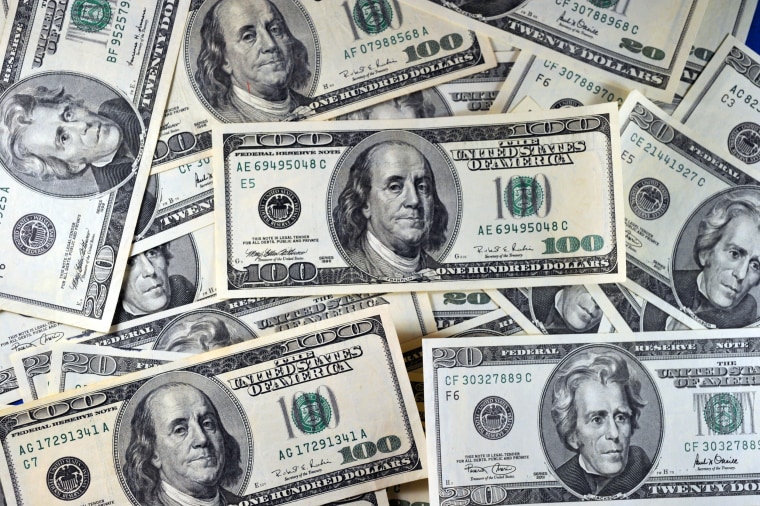Keeping track of the money in the 2016 presidential race will be harder than ever – with all of the candidates, all of the Super PACs, all of the other outside groups.
But here’s a handy guide on everything you’ll need to know.
Just more than two weeks from now, we’ll reach our next milestone in the 2016 presidential contest: The first results from the money race.
The 2nd fundraising quarter (April 1 thru June 30) ends on Tuesday, and the campaigns are required to report their results with the Federal Election Commission by July 15, while the deadline for the Super PACs is July 31. So those are the dates when we'll find out which campaigns have raked in the most money, as well as which big donors have written hefty checks to Super PACs.
Note: Only one major candidate – Sen. Ted Cruz, R-Texas – began his presidential campaign before April 1. So while the other campaigns will be reporting their first fundraising hauls of the 2016 race by July 15, this will be Cruz’s second report. And since Wisconsin Gov. Scott Walker and Ohio Gov. John Kasich won’t be announcing their presidential bids until after June 30, they won’t have to file their first campaign reports until Oct. 15.
Comparing apples with apples, oranges with oranges
It is important to use an apples-to-apples comparison when analyzing the fundraising. Compare campaigns with other campaigns, Super PACs with other Super PACs, and total hauls (campaigns + Super PACs) with other total hauls. Why? There are restrictions how these different entities can raise and use this money.
For example, if Hillary Clinton’s presidential campaign raises $50 million in the 2nd quarter, and the pro-Jeb Bush Super PAC, Right to Rise, brings in $60 million, you can’t say Jeb Bush outraised Hillary Clinton – because the Bush campaign is prohibited in coordinating with the Super PAC. Also, Super PACs can receive unlimited donations, while campaigns are restricted to just $2,700 per person in the primary and another $2,700 in the general.
But you can add up the Clinton campaign + Priorities USA Super PAC vs. Bush campaign + Right to Rise to see what the COMBINED enterprises have raised.
Putting the campaign hauls into perspective
Below are some historical comparisons to judge the fundraising totals we’ll see from the campaigns:
- As of June 30, 2007, Hillary Clinton had raised nearly $63 million and Barack Obama had raised nearly $59 million. (Caveat: Given that Clinton and Obama started their campaigns in Jan/Feb, that haul represented two quarters of fundraising, not one.)
- As of June 30, 2011, Mitt Romney had raised $18.3 million in his first fundraising report.
- As of June 30, 2011, Barack Obama had raised nearly $33 million in his first fundraising report, with another $12.75 million transferred from his previous campaign.
- As of June 30, 1999, George W. Bush had raised $37 million (but that was when campaign contributions were capped at $1,000 before the McCain-Feingold reforms).
Money can buy you love – but not always the presidential nomination
In the 2008 contest, the early fundraising leaders did not win the nomination
- Dem fundraising totals through June 30, 2007: Clinton $62.7 million, Obama $58.6 million, Edwards $23 million, Bill Richardson $13.3 million, Chris Dodd $12.1 million, Joe Biden $6.4 million.
- GOP fundraising totals through June 30, 2007: Romney $43.4 million, Giuliani $35.3 million, McCain $25.9 million, Sam Brownback $3.2 million, Ron Paul $3.0 million.
A guide to the different Super PACs
To make searching easier on the FEC.gov website, here are the names of the major Super PACs – and the candidate they’re backing.
REPUBLICANS:
Jeb Bush: Right to Rise PAC
Ben Carson: Run Ben Run and One Vote
Chris Christie: America Leads
Ted Cruz: Keep the Promise PAC, Keep the Promise PAC I, Keep the Promise PAC II, Keep the Promise PAC III
Carly Fiorina: Conservative, Authentic, Responsive, Leadership for You and America (CARLY For America)
Lindsey Graham: Security Is Strength PAC
Mike Huckabee: Pursuing America’s Greatness
John Kasich: New Day for America
George Pataki: We the People – Not Washington PAC
Rand Paul: America’s Liberty PAC
Rick Perry: Opportunity and Freedom PAC
Marco Rubio: Conservative Solutions PAC
Donald Trump: Citizens for Restoring USA
Scott Walker: Unintimidated PAC
DEMOCRATS:
Hillary Clinton: Priorities USA
Martin O’Malley: Generation Forward
What won’t be reported
While campaign and Super PAC money totals will be filed by July 15, we WON’T have any way to track the money hauls for the 501c4 non-profit groups helping certain candidates and parties. This is why they’re often referred to as “dark money” organizations.

